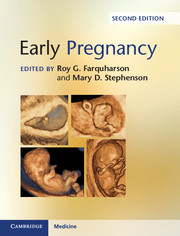Book contents
- Early PregnancySecond Edition
- Early Pregnancy
- Copyright page
- Contents
- Contributors
- Preface to the Second Edition
- 1 Endometrial Development and Gene Expression
- 2 Decidualization and Recurrent Miscarriage
- 3 Hemochorial Development
- 4 Implantation
- 5 Early Placental Development and Disorders
- 6 Meiosis and the Embryo
- 7 Environmental Toxicants and Reproduction
- 8 Thyroid Physiology and Early Pregnancy
- 9 Müllerian Duct Development
- 10 Candidate Genes for Pregnancy Loss
- 11 Antiphospholipid Antibodies and Reproduction
- 12 Defining Recurrent Pregnancy Loss
- 13 Guidelines on the Diagnosis and Management of Miscarriage
- 14 The Value of Early Pregnancy Units
- 15 Investigation of Recurrent Miscarriage
- 16 Designing and Optimizing Treatment Trials for Recurrent Pregnancy Loss
- 17 Risk Factors for First Trimester Miscarriage
- 18 Tubal Ectopic Pregnancy and Pregnancy of Unknown Location
- 19 Non-Tubal Ectopic Pregnancy
- 20 Ultrasound to Diagnose and Predict Early Pregnancy Outcome
- 21 Three-Dimensional Virtual Reality in Early Pregnancy
- 22 Molar Pregnancy
- 23 Role of Miscarriage Evaluation
- 24 Inherited Thrombophilia and Early Pregnancy
- 25 Immunotherapy and Recurrent Pregnancy Loss
- 26 Progesterone Use in Early Pregnancy
- 27 Vanishing Twin Syndrome and Long-Term Outcome
- 28 Obesity and Early Pregnancy
- 29 Chronic Endometritis and Reproduction
- 30 Miscarriage after In Vitro Fertilization (IVF)
- 31 HLA Associations and Recurrent Pregnancy Loss
- 32 Midtrimester Pregnancy Loss
- Index
- Plate Section (PDF Only)
- References
2 - Decidualization and Recurrent Miscarriage
Published online by Cambridge University Press: 16 February 2017
- Early PregnancySecond Edition
- Early Pregnancy
- Copyright page
- Contents
- Contributors
- Preface to the Second Edition
- 1 Endometrial Development and Gene Expression
- 2 Decidualization and Recurrent Miscarriage
- 3 Hemochorial Development
- 4 Implantation
- 5 Early Placental Development and Disorders
- 6 Meiosis and the Embryo
- 7 Environmental Toxicants and Reproduction
- 8 Thyroid Physiology and Early Pregnancy
- 9 Müllerian Duct Development
- 10 Candidate Genes for Pregnancy Loss
- 11 Antiphospholipid Antibodies and Reproduction
- 12 Defining Recurrent Pregnancy Loss
- 13 Guidelines on the Diagnosis and Management of Miscarriage
- 14 The Value of Early Pregnancy Units
- 15 Investigation of Recurrent Miscarriage
- 16 Designing and Optimizing Treatment Trials for Recurrent Pregnancy Loss
- 17 Risk Factors for First Trimester Miscarriage
- 18 Tubal Ectopic Pregnancy and Pregnancy of Unknown Location
- 19 Non-Tubal Ectopic Pregnancy
- 20 Ultrasound to Diagnose and Predict Early Pregnancy Outcome
- 21 Three-Dimensional Virtual Reality in Early Pregnancy
- 22 Molar Pregnancy
- 23 Role of Miscarriage Evaluation
- 24 Inherited Thrombophilia and Early Pregnancy
- 25 Immunotherapy and Recurrent Pregnancy Loss
- 26 Progesterone Use in Early Pregnancy
- 27 Vanishing Twin Syndrome and Long-Term Outcome
- 28 Obesity and Early Pregnancy
- 29 Chronic Endometritis and Reproduction
- 30 Miscarriage after In Vitro Fertilization (IVF)
- 31 HLA Associations and Recurrent Pregnancy Loss
- 32 Midtrimester Pregnancy Loss
- Index
- Plate Section (PDF Only)
- References
- Type
- Chapter
- Information
- Early Pregnancy , pp. 13 - 17Publisher: Cambridge University PressPrint publication year: 2017



